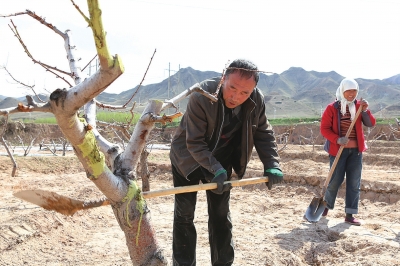The old carpenter changed his profession to become "chicken commander"
In Shangjiaomen Village, Ganjiang Town, Yuhuan, Master Huang Genling, who has been a carpenter for more than 30 years, can be regarded as a first-class carpenter. Last year, he actually quit his job as a carpenter and became a "chicken commander".
A few days ago, the author came to Huang Genling's guinea fowl farm. In an area of more than 200 square meters, flocks of chickens are pecking and playing. When someone came a little closer, the little guys flew with surprise. On closer inspection, these guinea fowl, which are gray all over and have regular white dots, have longer necks than ordinary chickens and have two cheeks on their faces. At first glance, they look a bit like peacocks.
Why did 52-year-old Huang Genling give up carpentry to become a "chicken commander"? He said that carpentry earns 200 yuan a day, the cumulative number of working days is less than 10 months, and the total income is less than 60,000 yuan. His wife Qin Lixiu could not work properly because of a broken foot, and all the expenses of the family depended on him. He wants to switch to raising chickens at home, so that he can not only take care of his wife, but also get good benefits. So, in March last year, he discussed with his wife that he would no longer work as a carpenter. After that, he brought his savings of 30, 000 yuan to Fujian to introduce more than 1200 guinea fowls and 600 Gaolan gray layers.
"the introduction of guinea fowl is mainly because we generally raise native chickens and three-yellow chickens here. I want to raise breeds that have not been raised by others to increase efficiency." Huang Genling said that this kind of chicken is rarely sick and cold-resistant, and eats rice and miscellaneous grains. Moreover, the cholesterol content in guinea fowl meat is relatively low, but its nutritional value is higher than that of ordinary chickens.
After months of raising, two or three two-weight chicks have been raised to about two kilograms of finished chickens. Looking at the guinea fowl that can be fenced out, Huang Genling was delighted. But the market made him worry.
"after the alpine immigrants in the whole village, our chickens were raised in our own homes and in our brothers' homes. Because of the relatively remote location and the fact that we went to the market to sell them, people didn't know anything about this kind of chicken, so the asking price was very low." Qin Lixiu said, "these chickens themselves are raised with rice. They can eat 16 barrels of rice a day, a full 150 jin." The cost is high, and the price is too low to recover the cost. If you don't sell it quickly, if you feed it one more day, it's thanks to one day. "
During the day, Huang Genling put the chickens on the hillside, let the chickens look for food in the forest, and drove them into the henhouse at night. This not only saves money, but also makes the chicken meat better.
On the eve of the Spring Festival, local media reported that the chicken market of Huang Genling's family was basically open. At present, his family still has more than 700 guinea fowls and 420 Gaolan gray laying hens.
On that day, Huang Genling and his wife smiled and calculated an account for the author. It costs 75 yuan to 80 yuan for a chicken to be raised. If the price of each chicken is 150 yuan, there will be a profit of about 50%. Excluding labor and other expenses, it is much better than before to do carpentry.
At present, these chickens have a high egg production, especially Gaolan gray laying hens, which can lay a total of about 360 eggs, while each guinea chicken can lay a total of 170-180 eggs, while local chickens only produce 120-130 eggs. In terms of egg price, Gaolan gray laying hens' eggs cost 60 yuan per kilogram, which is also about 20 yuan higher than ordinary eggs. Huang Genling said that at present, they plan to reinvest all the money saved from selling eggs, hatch their own chickens and expand the scale of raising chickens to thousands.
- Prev

Planting ten thousand mu cherry Lin Yongdeng and his wife embarked on the road to prosperity
Planting ten thousand mu cherry Lin Yongdeng and his wife embarked on the road to prosperity
- Next

Abandon "industry" to lead the way from agriculture to wealth, the golden pigeon brand takes the lead in eastern Guangdong
Abandon "industry" to lead the way from agriculture to wealth, the golden pigeon brand takes the lead in eastern Guangdong
Related
- A course of planting techniques and methods on how to grow carrots
- How to plant the latest tulips?
- Is it better to pick tea in the morning or in the afternoon? When is the best time for tea to be picked? what is the third or fifth tea?
- Launch Yuanxiao Happy combination Haocha + Tea Yuan healthy Taste
- Penghu Tourism "Fireworks 20 Parade with You"
- 2022 West Lake Happiness holds "Digital Revitalization Voucher" and draws iphone13 and laptop.
- Banqiao Fuzhou social houses are designed to change start-up combined with police elimination to create a safe and livable environment
- The convenient measure of "mechanical weeding" in Xinbei has been abused and the Agriculture Bureau has imposed heavy penalties on the illegal land consolidation.
- Changgeng University Joins Hands with Four Memory Factories to Rescue Memory Talent Shortage
- The list of Taiwan's top 100 MVP managers is listed by the Director-General of the Farmers' Association of Sanxia District.

